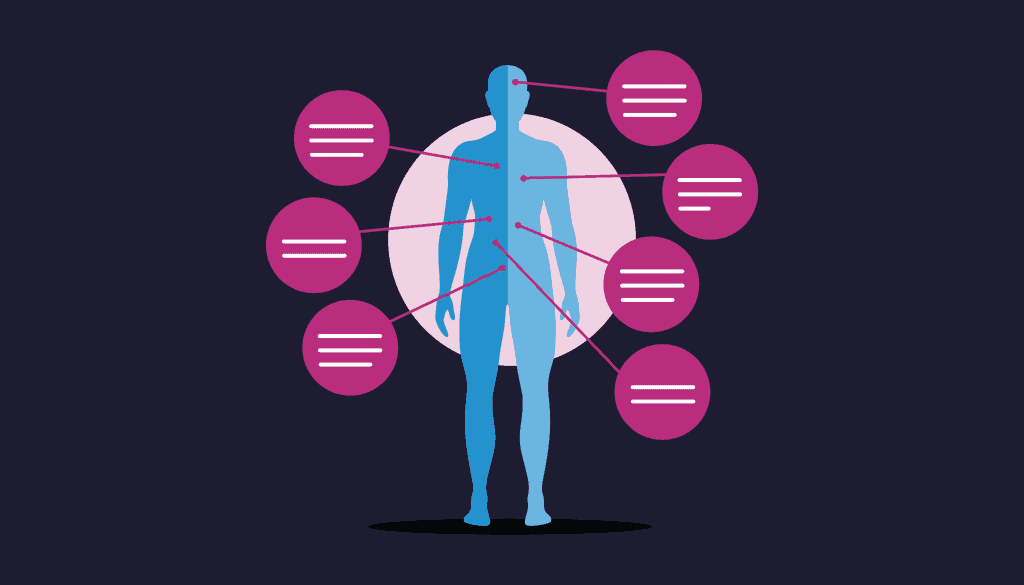What is a chest infection?
- Categories: Health & Wellbeing
Joe Webber
Share this article
We get chest infections when there’s an infection present in our windpipe, bronchi or lungs, with bronchitis and pneumonia being the most common types. How bad they can get can range from mild – going away without treatment, to being very serious and life threatening. They aren’t always obvious to spot straightaway but there are several key symptoms that you can check for, including:
- A chesty cough
- Coughing up green or yellow mucus
- Wheezing and shortness of breath
- Chest pain
- A high temperature of 38.0°C or above (see How to Check Body Temperature for a Fever)
- A headache
- Aching muscles and pains
- Tiredness and fatigue
Chest infections are common after having a cold or flu, so pairing this with experiencing one or more of the above symptoms can be a clear sign of an infection. The majority of symptoms usually last for 7-10 days but in some cases coughs and mucus can last for up to three weeks.

What can you do?
There are two main types of chest infection: virus and bacteria.
Viruses are more common and should clear up on their own after plenty of bed rest. Extra pillows can be added to raise the head up and assist with breathing and help rid the chest of mucus. Painkillers can be taken to relieve fevers, headaches and muscle aches, and hot water with lemon and honey may sooth sore throats. A pharmacist can also prescribe decongestant treatments to loosen up mucus if it’s severe, if they believe necessary.
Bacteria infections can be treated with antibiotics at the GP’s recommendation, in addition to the above bed rest. The full course of antibiotics must be taken even if the infection has subsided before the end of treatment, because it can easily return.
Smoking will also make the infection worse, and there is little evidence to show cough syrups can relieve symptoms.
What should you be aware of?
Please note, because symptoms of chest infections are comparable to COVID-19, the individual should remain isolated as a precaution and should not personally visit a pharmacist or GP.
The elderly, pregnant women, smokers, people with weakened immune systems or chronic health conditions like asthma or diabetes, babies and young children are among those who are at increased risk.
Reducing the risk of infection
If the individual is 65 years or older, or prone to infections, they can also ask their GP about getting a flu or pneumonia vaccination. Improving overall health and the immune system, including stopping smoking and drinking alcohol, may also help.
The risk of infection spreading to other people can be reduced by covering the mouth when coughing or sneezing, washing hands regularly and throwing away any used tissues after use.

Recording chest infections on CareDocs
Chest infections can be recorded on body maps through CareDocs Local or CareDocs Cloud. When you have the new Body Map event open, click on the body part you wish to record a condition for. Next, you’ll need to choose Chest Infection from the Condition list and set the time and date you first identified it. You can also enter an additional description in the Condition Information box if necessary, and also any Nursing Care instructions you wish to communicate. Finish by setting a Home Status page reminder by clicking on the Review button and hit Save.
You can then go back and update the Event with new information, insert a photo, and amend the plan of care if necessary. Finally, add a Treatment Ended Event Note when the condition has healed.
To find out more about CareDocs and how our software can support outstanding care in your care home, phone 0330 056 3333 or email sales@caredocs.co.uk.
Share this article
Author
Joe Webber
Search
Recent articles
- CareDocs Partners with the Professional Record Standards Body (PRSB) to Support Care Standards Fit for the Future of Digital Care January 30, 2024
- CareDocs Joins the Care Software Providers Association (CASPA), an Independent, Not for Profit Association, Representing Software in the Care Industry January 19, 2024
- CareDocs partners with Bristol Waste to tackle digital poverty January 10, 2024
Recent comments
- 1.2. Assess use of care plans in applying person-centered values - CIPD Writers on What is person centred care planning and why is it important?
- Call tracking tips for care home marketers - Chester Times on The importance of effective communication in care
- Why is effective communication important for positive relationships with individuals in care? - Building-Craft on The importance of effective communication in care











